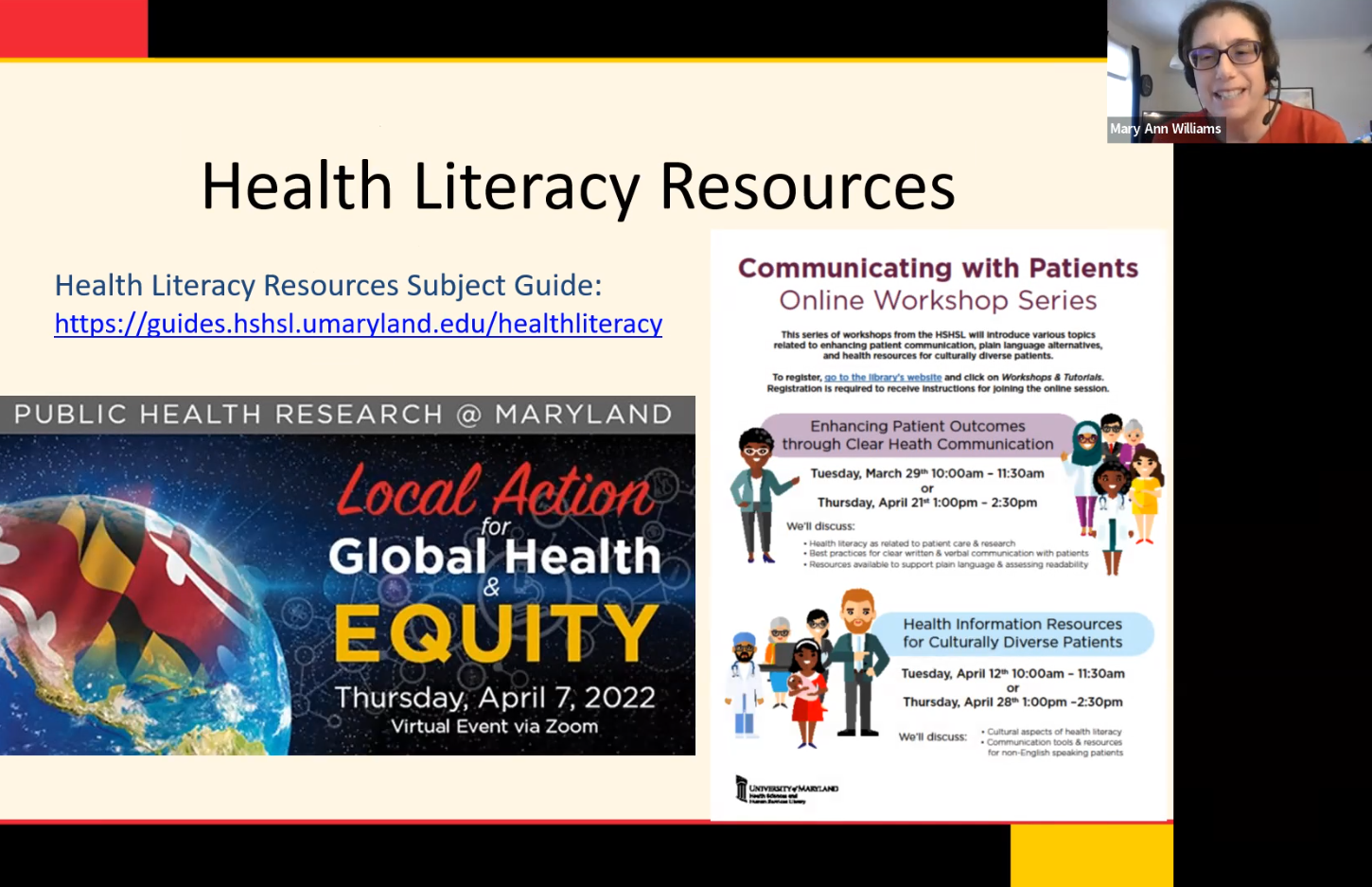March 4, 2022
This month's meeting covered topics related to Health Literacy. Speakers included members of the MPower Health Literacy Faculty and University of Maryland Medical System clincal staff.
Cynthia Baur, PhD, Endowed Chair and Director, Horowitz Center for Health Literacy, is a health literacy and health communication expert focused on improving health literacy at the individual, family, community and organizational levels. She is a professor in the Department of Behavioral and Community Health and the Principal Investigator on multiple projects on health literacy techniques for clear communication, digital health, diabetes and organizational improvement. She provides expert advice to local, state and national committees and initiatives. Before coming to UMD, she served for almost 20 years in federal health agencies.
Elsie Stines, DNP, CRNP joined the Division of Pediatric Gastroenterology and Nutrition at the University of Maryland Hospital for Children in 2001 as a pediatric nurse practitioner. She has a joint appointment with the University of Maryland Medical Center and the University of Maryland, Baltimore (UMB) as a pediatric nurse practitioner and as assistant vice president of special projects and initiatives to UMB President Bruce E. Jarrell, M.D., FACS respectively.
Mary Ann H. Williams, MSLS is the Research, Education & Outreach Librarian and School of Dentistry Librarian. Her expertise includes expert literature searches, systematic reviews, evidence-based practice, health literacy and clear health communication, and cultural health information resources
Dr. Baur and Dr. Stines discussed their cross-campus faculty team, which has been meeting for two years now and started as an MPower Activity to bridge gaps across campuses when it comes to Health Literacy training and education. Public Health Research Day is another upcoming activity highlighting the work of this group. The group has conducted a literature review that looks at teaching health literacy in all of the respective disciplines and have published a white paper as part of the President's Initiative on the UMB campus and is available here. The group has also received seed funding and completed projects in the area of better addressing health literacy as a social determinant of health, including the interprofessional and multidisciplinary President's Clinic where students come together to learn about team-based care and caring for children with GI diseases.

Mary Ann Williams shared some of the ways that the Health Sciences Library supports health literacy. She highlighted the Health Literacy Resource Subject Guide which is available on their website. Additionally, she mentioned opportunities for members of the campus to raise their own health literacy and improve their communication through the two workshops offered by the library. The Spring sessions are open for registration on the HSHSL website. The first is called Enhancing Patient Outcomes Through Clear Health Communication, which includes some background on healthy literacy, and best practices for written and verbal communication, and includes opportunities for real life practice. The second workshop is called Health Information for Culturally Diverse Patients. This workshop introduces attendees to resources which will help them better understand how to work with different cultures and guide them to translated materials. Finally, Mary Ann called for ideas for health literacy related topics for resources or workshops.
We were also joined by Lisa Schocket, MD, who is an associate professor and the vice chair for clinical affairs and Chief of the Retina Division at the University of Maryland, Department of Ophthalmology. Dr. Schocket specializes in the medical and surgical management of retinal diseases including diabetic retinopathy and she gave a presentation to the group that highlighted diabetic retinopathy as a health disparity in Baltimore and discussed ways in which low health literacy is a social determinant of this disparity. Building trust to improve health literacy and adherence to healthcare interventions to save vision after a diagnosis of diabetic retinopathy were themes throughout the presentation and in the following discussion.
If you would like to speak about a Health Equity topic related to research or translating research into practice at an upcoming meeting, please let us know. We also welcome suggestions for topics and speakers, as well as new members to our Think Tanks. Stay tuned for information about our May All Member Meeting.
